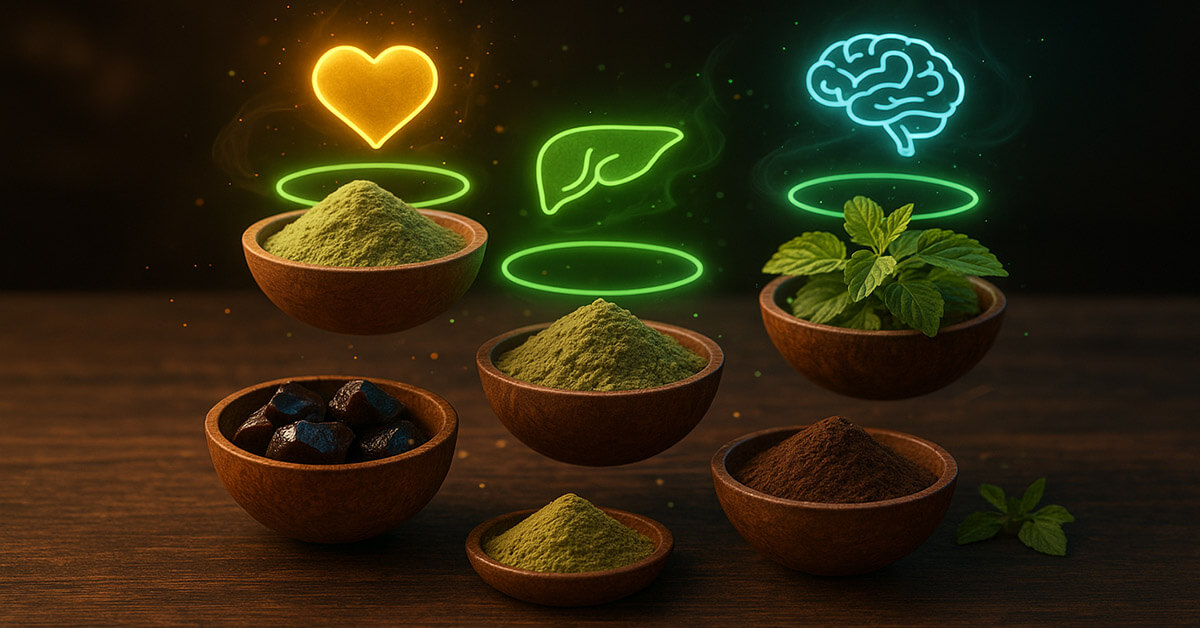
The Surprising Ayurvedic Herbs that Could Transform Your Health

For thousands of years, Ayurveda—the traditional system of medicine from India—has relied on herbs, roots, and minerals to restore balance and support wellness. Today, many of these remedies are attracting global attention, not just for their deep cultural roots but also for their promising evidence in modern research. From boosting heart health to easing stress and sharpening memory, Ayurvedic herbs are bridging the gap between tradition and science. In this guide, we’ll explore the most surprising Ayurvedic herbs, grouped by the health benefits they’re best known for.
For Heart Health
Arjuna (Terminalia arjuna)
Known as a heart tonic in Ayurveda, Arjuna bark has been used for centuries to strengthen cardiac muscles, improve circulation, and regulate blood pressure. It’s one of the cornerstone remedies for cardiovascular wellness in traditional Indian medicine.
📊 Clinical Evidence: Multiple randomized trials in India reported that Arjuna bark extract improved symptoms of stable angina, enhanced cardiac output, and reduced blood pressure with good tolerability.
✔️ Typical Dosage Range: 500–1,000 mg daily of standardized bark extract, usually divided into two doses.
Guggul (Commiphora mukul)
Derived from the resin of the Mukul tree, Guggul is prized for its cholesterol-lowering and detoxifying properties. In Ayurveda, it’s used in formulations for weight management and metabolic balance.
📊 Clinical Evidence: Clinical studies have shown that Guggulsterones, the active compounds in Guggul, can lower triglycerides and LDL cholesterol, while raising HDL levels in some populations.
✔️ Typical Dosage Range: 25–50 mg of guggulsterones daily, often provided in extracts standardized to 2.5–5% guggulsterones.
Amla (Indian Gooseberry)
Amla is one of Ayurveda’s most versatile fruits, loaded with vitamin C and antioxidants. Traditionally, it has been used for rejuvenation, digestion, and heart support.
📊 Clinical Evidence: Several human trials have found that Amla supplementation lowers LDL cholesterol, reduces oxidative stress, and improves endothelial function, making it a strong ally for cardiovascular health.
✔️ Typical Dosage Range: 500–1,000 mg daily of fruit powder or standardized extract.
For Detoxification & Cleansing
Triphala
One of Ayurveda’s most famous formulas, Triphala blends three fruits—Amla, Haritaki, and Bibhitaki. It is used for gentle detox, digestive support, and balancing all three doshas.
📊 Clinical Evidence: Randomized controlled trials suggest that Triphala improves bowel regularity, relieves constipation, and may have antioxidant and anti-inflammatory properties.
✔️ Typical Dosage Range: 500 mg to 1.5 g daily, usually taken before bed.
Neem (Azadirachta indica)
Known as the “village pharmacy” in India, Neem is considered a powerful blood purifier with antibacterial and antifungal properties. It’s often used for skin conditions and detox programs.
📊 Clinical Evidence: Limited human trials show Neem may help lower blood sugar and improve skin health. Its antimicrobial properties are well-documented in laboratory studies.
✔️ Typical Dosage Range: 300–600 mg daily of Neem leaf or bark extract.
Guduchi (Tinospora cordifolia)
Often called “Amrita,” meaning “the nectar of immortality,” Guduchi is considered a Rasayana herb in Ayurveda, promoting longevity and vitality.
📊 Clinical Evidence: Studies in India have found Guduchi enhances liver function, supports detoxification, and modulates immune response in patients recovering from illness.
✔️ Typical Dosage Range: 300–500 mg twice daily of standardized extract.
For Immunity
Guduchi (Tinospora cordifolia)
Known in Ayurveda as “Amrita” or the nectar of immortality, Guduchi is one of the most respected Rasayana herbs for immune resilience. It helps the body fight infections, reduces inflammation, and supports recovery during illness.
📊 Clinical Evidence: A 2014 randomized controlled trial in patients with allergic rhinitis found that Guduchi extract significantly reduced sneezing, nasal congestion, and itching, showing strong immunomodulatory effects without major side effects.
✔️ Typical Dosage Range: 300–500 mg of standardized Guduchi extract, taken twice daily.
Tulsi (Holy Basil)
In Ayurveda, Tulsi, often called the “Queen of Herbs”, is revered not only for its spiritual significance but also for its immune-boosting power. It helps the body resist infections, especially respiratory illnesses, and supports overall resilience.
📊 Clinical Evidence: A randomized controlled trial in India found that daily Tulsi extract reduced the incidence and duration of common cold and flu episodes, while improving immune response markers such as T-cell activity.
✔️ Typical Dosage Range: 300–600 mg daily of standardized leaf extract, or 1–2 cups of Tulsi tea per day.
For Anti-Aging & Vitality
Shilajit
A mineral-rich resin that oozes from the Himalayas, Shilajit is considered one of the most potent Rasayana (rejuvenating) substances in Ayurveda. It is said to boost energy, sexual vitality, and resilience.
📊 Clinical Evidence: A double-blind, placebo-controlled study found that purified Shilajit supplementation increased free testosterone and improved fatigue scores in healthy men.
✔️ Typical Dosage Range: 200–500 mg daily of purified Shilajit resin or extract.
Chyavanprash
This traditional herbal jam combines Amla with dozens of other botanicals, ghee, and honey. Chyavanprash is used to rejuvenate energy, boost immunity, and enhance vitality.
📊 Traditional Use: While large clinical trials are limited, Chyavanprash has been consumed for centuries in India as a daily tonic for immunity and vitality.
✔️ Typical Dosage Range: 1–2 teaspoons daily, often taken with warm milk.
For Mental Wellbeing
Gotu Kola (Centella asiatica)
Gotu Kola is revered as a brain tonic in Ayurveda. It’s used to sharpen memory, reduce anxiety, and promote calm mental clarity.
📊 Clinical Evidence: Human studies show Gotu Kola supplementation improves working memory, reduces anxiety, and supports cognitive function in older adults.
✔️ Typical Dosage Range: 500–750 mg daily of leaf powder or standardized extract.
Mucuna pruriens
Also called velvet bean, Mucuna is a natural source of L-Dopa, a precursor to dopamine. It’s traditionally used to enhance mood, energy, and fertility.
📊 Clinical Evidence: Randomized trials suggest Mucuna extract improves symptoms in Parkinson’s disease patients and boosts sperm quality in infertile men.
✔️ Typical Dosage Range: 250–500 mg daily of standardized extract.
For Women’s Health
Shatavari (Asparagus racemosus)
Shatavari is considered the “queen of herbs” for women in Ayurveda. It is used to support fertility, balance female hormones, ease menopausal symptoms, and enhance lactation.
📊 Clinical Evidence: Small clinical studies suggest Shatavari may improve lactation in new mothers and help relieve menopausal symptoms such as hot flashes and mood swings.
✔️ Typical Dosage Range: 500–1,000 mg daily of root powder or standardized extract.
Conclusion
From heart health to stress resilience, Ayurvedic herbs like Arjuna, Amla, Shilajit, and Tulsi demonstrate the enduring wisdom of India’s traditional medicine system. While modern research confirms many of their benefits, it’s important to approach these remedies thoughtfully, consult a healthcare provider when necessary, and choose high-quality standardized extracts. By combining the wisdom of Ayurveda with today’s clinical insights, these herbs may indeed transform your health in surprising ways.
FAQ
What are Ayurvedic herbs?
Ayurvedic herbs are plants, roots, and minerals traditionally used in India’s Ayurvedic system of medicine for balancing health, improving vitality, and preventing disease.
Are Ayurvedic herbs scientifically proven?
Some herbs, like Arjuna, Shilajit, and Tulsi, are backed by clinical studies showing cardiovascular, energy, and stress-relief benefits. Others are mainly supported by centuries of traditional use.
Are there any side effects of Ayurvedic herbs?
Most Ayurvedic herbs are safe when taken in recommended dosages, but some may cause digestive upset or interact with medications. Always consult a healthcare professional before starting supplementation.
Which Ayurvedic herbs are best for stress and mental health?
Adaptogenic herbs like Tulsi (Holy Basil), Gotu Kola, and Mucuna pruriens are often used to reduce anxiety, improve mood, and support cognitive performance.
This article was originally published on Stackbb, your trusted source for science-based supplement guides.







